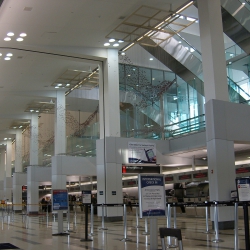
Philadelphia International Airport could offer online gambling, if it paid a $5 million licensing fee.
The Pennsylvania Senate approved the expansion of casino-style gambling and online fantasy sports in a 38-12 vote on Wednesday. Pennsylvania lawmakers believe the expansion of gambling is a way to draw interested from younger gamblers.
The bill has a lot of moving parts, including provisions for online casinos, online poker, lottery ticket sales, airport gambling, additional local taxes, regulated daily fantasy sports, and a casino marketing tax.
If passed by the Pennsylvania State House of Representatives and signed by Gov. Tom Wolfe, the bill would represent a major expansion of gambling in the state.
The bill also would increase taxes on casino operators. Some speculated that the impending legislation might have killed a $1.3 billion deal between Las Vegas Sands Corp and MGM Resorts last week for the Sands Resort Casino Bethlehem.
Online Poker and Casinos
Pennsylvania brick-and-mortar casinos would have the right to pay a one-time $5 million online gaming licenses to operate slot machine-style games online. If the land-based casinos paid an additional $5 million fee, it could operate peer-to-peer table games (poker) online. The operators would get no discount if they bought a license for each; it would be a $10 million fee.
The money from the licensing fees would go into the state’s General Fund. If the state’s casinos did not apply for an online gambling license, then other state operators would be able to apply after 90 days.
Online and Mobile Gambling Tax Rate
The land-based tax rates on gambling would apply to the online rates. Peer-to-peer table games would have a 16% tax rate, while slot machine gambling would have a 54% tax rate.
Online Lottery Betting
The Pennsylvania Lottery would be able to offer their own types of online gambling. This would include online raffle games, scratch-off instant tickets (scratchcards), and its existing games. It appears that Pennsylvania lottery players would be able to buy state lottery tickets online.
The state lottery would not be able to offer casino style games online, though. The Pennsylvania Lottery specifically is barred from offering online poker, slots, blackjack, or roulette in the bill.
Airport Lottery Terminals
International and regional airports would be allowed to operate online gambling portals in their terminals. Only ticketed passengers would have access to the gaming machines. Also, specific licensing fees have been assigned to different airports.
The tax rate for airport gambling revenues would be 34%. Additionally, the Philadelphia airport would need to pay a $5 million licensing fee. The Pittsburgh airport would need to pay $2.5 million, while the airports in Erie, Lehigh Valley, Harrisburg, and Wilkes-Barre/Scranton would need to pay $1 million. Finally, the University Park Airport in State College and the Arnold Palmer Regional Airport in Latrobe would need to pay a $250,000 licensing fee apiece.
Daily Fantasy Sports Provision
Daily fantasy sports would be made legal in the state. DFS operators would need to pay licensing fees, along with a 12% tax rate on the contest’s adjusted revenues. The licensing fee would be a 7.5% of the operator’s annual adjusted revenues, with a minimum fee of $5000 and a maximum fee of $50,000.
Licenses would be extended to daily fantasy sports companies like FanDuel and DraftKings, with no need to hold a land-based gaming license in the state. Players would need to be 18 years or older. Age verification software would be required and players would need to undergo an age verification process.
Gaming Tax Increases
Brick-and-mortar casinos would be required to pay a “local share” tax. This is the same as the local tax struck down by the Pennsylvania Supreme Court last year, and is meant to replace an expiring casino tax of 4% that has been in place since 2002.
Under terms of the new deal, larger casinos would need to pay $10 million in a local share tax to the community in which they’re located. The terms stipulate 2% to the community and 2% to the county, or $10 million — whichever is greater. SugarHouse Casino in Philadelphia is not subject to the $10 million minimum.
Revenue Sharing Tax
A casino marketing tax of 0.5% would be imposed on the larger casinos, too. This money would go into a central fund, then used to pay lower-grossing casinos in the state. These casinos would need to spend the cash on renovations and improvements to their gaming venue.
Presque Isle Downs and Casino in Erie and Mount Airy Casino Resort in the Pocono Mountains would receive $5 million apiece in the revenue sharing plan, while SugarHouse Casino would receive $3 million. The revenue sharing is a temporary expendient, as it would disappear after 10 years. Also, if every casinos brings in more than $200 million over the same time, the revenue sharing tax would go away before the 10 years is over.
Resort Casino Exemption Fee
Finally, resort casinos that were required to insist on players using the casino’s amenities under the 2004 law would be able to pay a $1 million fee to be exempted from that provision. Thus, Lady Luck Casino Nemacolin in southwestern Pennsylvania and Valley Forge Casino in suburban Philadelphia could pay $1 million apiece to do away with the amenities provision. Under that stipulation, players had to spend a night at the casino-resort in order to be allowed to gamble.
Chances of Passage in the Pennsylvania House
Though the Pennsylvania State Senate passed the bill on a bipartisan basis, it is thought the gambling bill is going to face a tougher test in the House of Representatives. Such a packed gambling bill has many chances to offend local business interests. With more legislators in the House, there are more lawmakers whom special interests could influence.
